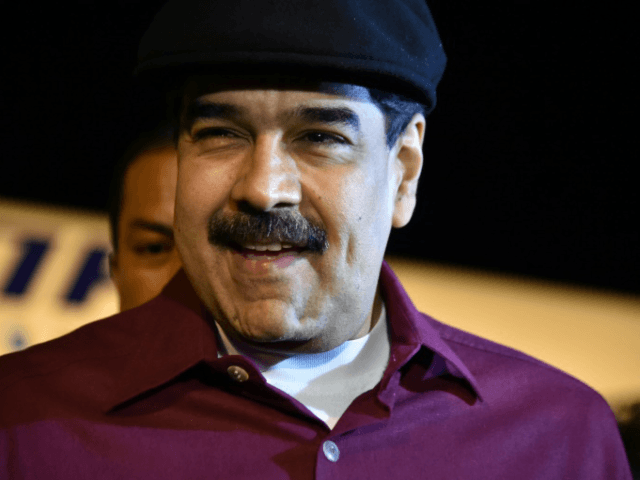During the latest episode of his television series Sundays with Maduro, Venezuelan dictator Nicolás Maduro accused U.S. President Donald Trump of having a “fatal obsession with me” and bragged that growing American sanctions on his country “mean I’m doing something right.”
Under Maduro, Venezuela has become a failed state with near-total medical shortages and under constant threat of famine. Nearly 90 percent of Venezuelans cannot afford to buy three meals’ worth of food a day, and 15 percent rely on eating industrial garbage to survive.
“He names me every day, not a day goes by that he doesn’t mention me,” Maduro told an audience during his program Sunday night, “I’ve become a fatal obsession for Mr. Donald Trump.”
“The attacks from the empire honor me,” he continued, using a pejorative for the United States popularized by late communist mass murderer Fidel Castro. “That means I’m doing something right!”
“He has made me famous around the world. Every time he mentions me, they love me more,” he added.
Maduro went on to address the fact that he is now often referred to as a dictator, following his creation of a parallel legislature to usurp the power of the democratically-elected National Assembly. “Is it possible to have a socialist dictatorship? Impossible! The only dictatorship possible is capitalism,” he asserted.
Throughout the four-hour broadcast, Maduro also claimed that Trump had become “the head of the Venezuelan opposition,” joking that the United States had become unsatisfied with opposition leader Julio Borges, the president of the National Assembly.
“Julio Borges is no good, now I’m the boss,” Maduro said in an Americanized accent, attempting to imitate the U.S. president. “That’s what Donald Trump said.”
While insulting the opposition, Maduro also announced the beginning of a new round of dialogue with opposition leaders.
President Trump has made the growing political crisis in Venezuela, which spawned daily protests between March and August 2017, a priority for his administration. Speaking at an event to celebrate Hispanic Heritage Month, Trump reiterated that his administration has “taken decisive action to stand with the good people of Cuba and Venezuela.”
“We also stand with the people of Venezuela, who are suffering under the ruthless socialism of the Maduro regime,” Trump added. “We reject socialist oppression, and we call for the restoration of democracy and freedom for the citizens of Venezuela.”
The communist Castro regime of Cuba wields significant leverage in Venezuela, with some estimates putting the number of Cuban government agents active in Venezuela in the tens of thousands.
“The same failed communist ideology that has brought oppression to Cuba has brought nothing but suffering and misery everywhere and every place it has been anywhere in the world,” Trump said. “Communism is the past. Freedom is the future.”
The Trump administration has imposed sanctions on Maduro personally, banning him from the United States and barring Americans from doing business with him, as well as other prominent chavistas such as Adán Chávez, brother of late dictator Hugo Chávez, and Tareck El Aissami, the nation’s vice president. The Treasury branded El Aissami a “Specially Designated Narcotics Trafficker” under the Drug Kingpin act over his ties to a variety of narcotics traffickers and terrorist groups active in the region. More general sanctions on Venezuela include a ban on American citizens and companies from dealing in Venezuelan debt or the debt of its state-run oil company, Petróleos de Venezuela (PDVSA).
Maduro’s gross mismanagement of the Venezuelan economy and violent persecution of political opponents has created an international Venezuelan diaspora, with thousands of Venezuelans seeking refuge in the United States. More Venezuelans have filed asylum requests with the U.S. Citizenship and Immigration Service than citizens of Syria, Haiti, and China.

COMMENTS
Please let us know if you're having issues with commenting.